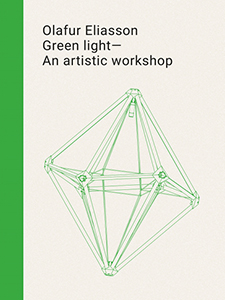This publication documents Eliasson's Green light project —an artistic workshop for refugees, asylum seekers, migrants, and NGOs, whose goal is to fabricate lamps for fundraising education. It provides testimonies, stories, and memories by Green light participants, founders, and organizers, as well as essays by art historians and theorists.
Green light is a project initiated by artist Olafur Eliasson in collaboration with Thyssen-Bornemisza Art Contemporary, Vienna. Conceived as a field of production and mutual learning, Green light works with refugees, asylum seekers, migrants, and NGOs to fabricate an unlimited edition of fully functional lamps: geometric, stackable modules made from recyclable materials and fitted with a welcoming green light. Providing fundraising and education opportunities, Green light workshops first took place in Vienna in 2016, and have since been hosted at the Moody Center for the Arts, Houston, and the 57th Venice Biennale.
Green light expresses itself as both a comment and an active response to the legal and social obstacles refugees and asylum seekers face in accessing education, the labor market, and social life. As a social and artistic experiment, it sets out to explore the possibilities and agency of art and cultural institutions in the face of challenges and potentials posed by migration.
This publication seeks to question and reflect on the project by providing testimonies, stories, and memories by Green light participants, founders, and organizers, as well as essays by art historians and theorists reflecting on the relationship between culture and migration today.
“Green light is an act of welcoming, addressed both to those who have fled hardship and instability in their home countries and to the residents of the cities receiving them. Working together in a playful creative process, participants build a modular light and construct a communal environment in which difference is not only accepted but embraced.”
–Olafur Eliasson
With Atif Akin, Anas Aljajeh,
Tarek Atoui, Tawab Baran, Ian Cion, Angela Dimitrakaki, Olafur Eliasson, Paul Feigelfeld, Francesca von Habsburg,
Timothy Morton, Sandra Noeth,
Ahmet Ögüt,
Boris Ondreička, Johannes Porsch, Clemens Rettenbacher, Andreas Roepstorff, David Rych, Rasha Salti, Georg Schöllhammer, Shuddhabrata Sengupta, Anahita Tabrizi, Alison Weaver, Franziska Sophie Wildförster, Nira Yuval-Davis, Daniela Zyman, Green light participants.
Olafur Eliasson (born 1967, lives and works in Copenhagen and Berlin) grew up in Iceland and Denmark and studied, from 1989 to 1995, at the Royal Danish Academy of Fine Arts. In 1995, he moved to Berlin and founded Studio Olafur Eliasson, which today encompasses some ninety craftsmen, specialised technicians, architects, archivists, administrators, programmers, art historians, and cooks. Olafur Eliasson's art is driven by his interests in perception, movement, embodied experience, and feelings of self. Eliasson strives to make the concerns of art relevant to society at large. Art, for him, is a crucial means for turning thinking into doing in the world. Eliasson's diverse works—in sculpture, painting, photography, film, and installations—have been exhibited widely throughout the world. Not limited to the confines of the museum and gallery, his practice engages the broader public sphere through architectural projects and interventions in civic space.

